The August Revolution of 1945 not only opened an era of independence and freedom for the nation, but also laid the foundation for building a democratic and progressive national regime. It is this foundation that helps Vietnam maintain its revolutionary achievements, overcome challenges and continuously develop.
Prof. Dr. Ta Ngoc Tan, former Director of the Ho Chi Minh National Academy of Politics , Permanent Vice Chairman of the Central Theoretical Council, said that in the context of the nation entering an era of rising up, we need not only to look to the future, but also to look back at the past to exploit the depth of history, promoting valuable lessons from the practice of institution building after the August Revolution of 1945, in new historical conditions.

The Government of the Democratic Republic of Vietnam was elected by the 1st National Assembly. In the front row, in the middle is President Ho Chi Minh , on the right is Mr. Nguyen Van To, on the left is Mr. Huynh Thuc Khang. (Source: National Archives Center III)
Laying the foundation for a new national institutional system
Looking back at the victory 80 years ago, Professor Dr. Ta Ngoc Tan said that under the leadership of the Party, headed by President Ho Chi Minh, we urgently built an independent national institutional system, comprehensive people's democracy in all fields to "lead" the process of creating and building a new society and protecting the achievements of the revolution.
Immediately after taking power, one of the first things the revolutionary government did was to focus on forming an administrative apparatus from the central to the grassroots level, considering this an essential foundation of the new democratic regime. The provisional government of the Democratic Republic of Vietnam, headed by President Ho Chi Minh, was established. The executive apparatus initially consisted of ministries.
At the same time, urgently organize local government according to the principle of people's democracy. Resistance committees were established at commune, district and provincial levels, performing the functions of administrative management, organizing resistance, maintaining security and order and improving people's lives.
Revolutionary mass organizations such as the Viet Minh Front, the Vietnam National United Front, the Women's Association for National Salvation, the Youth Union for National Salvation, etc. became core forces supporting the building and protection of the People's government, creating broad cohesion between the Party, the government, and the masses.
" The establishment of a government system from the central to local levels is being carried out urgently and systematically, creating conditions for the country to enter a new phase as an independent, sovereign nation with clear institutions, " affirmed Professor, Dr. Ta Ngoc Tan.

Decree No. 63 issued on November 22, 1945 by the President of the Provisional Government of the Democratic Republic of Vietnam regulating the organization of People's Councils and Administrative Committees at all levels. (Source: National Archives Center III)
Professor Dr. Ta Ngoc Tan stated that at that time, the construction of a system of administrative institutions from the central to the grassroots level was carried out according to the principle of democratic centralism, closely linked to the people, and subject to the people's inspection and supervision.
President Ho Chi Minh affirmed: " The government from the commune to the Central Government is elected by the people" and "If the Government harms the people, the people have the right to oust the Government ".
In that spirit, on November 22, 1945, the Government issued Decree No. 63 regulating the organization of People's Councils and Administrative Committees at all levels. The regulation clearly stated: "In each village, commune... there will be an Administrative Committee elected by the people by universal suffrage".
" Establishing institutions at the grassroots level is the institutionalization of the principle of direct democracy, empowering the people to self-organize and run village affairs. This demonstrates respect for the people's role in social management and is an important component in the unified institutional system from within the effective governance model, which is both flexible in wartime and shapes the first democratic administration in our country, " said Mr. Tan.
Regarding the division of labor and decentralization in the apparatus, President Ho Chi Minh clearly stated: " We must consider carefully. Do not be hasty, do not act haphazardly, do not act recklessly. Do not act as you see fit ." This, according to Professor, Dr. Ta Ngoc Tan, demonstrates modern management thinking, requiring clarity in functions, authority, and responsibilities.
In particular, President Ho Chi Minh emphasized the key role of cadres and civil servants in the state apparatus, considering cadres and civil servants as the central element in the public service system, needing to be trained, fostered, and practiced in both ethics and capacity. Accordingly, the Government issued regulations on the selection of administrative cadres and civil servants based on capacity, political qualities and revolutionary ethics.
Besides, the Government respected intellectuals and experts under the old regime who were knowledgeable about institutions and social operations.
" People like King Bao Dai, Mr. Huynh Thuc Khang and many officials and intellectuals of the feudal court such as Bui Bang Doan (Minister of the Ministry of Justice of the Nguyen Dynasty), Phan Ke Toai (Imperial Commissioner of the North of the Tran Trong Kim Government), Pham Khac Hoe (Royal Secretary of King Bao Dai), Tham Tri Dang Van Huong; Vi Van Dinh (former Governor of Thai Binh), Ho Dac Diem (former Governor of Ha Dong)... were invited to be advisors and participate in the new State apparatus thanks to their knowledge, experience and dedication to the country, " said Mr. Tan.
This policy, according to Professor Tan, demonstrates an open, useful and tolerant institutional mindset, not being concerned with background but putting national interests first. This is also a humane approach to institutional development based on knowledge that our Party, headed by President Ho Chi Minh, has applied very flexibly to build a national institutional system in the context of historical transition at that time.
Perfecting modern institutions to break through
In the context of the nation's historical transformation, Vietnam not only defended its independence as after the August Revolution in 1945 but also went further, affirming the country's foundation, position and prestige in the international arena. It was an era of strong development, just as the historical expectation that opened in the fall of 1945.
Along with favorable opportunities, Prof. Dr. Ta Ngoc Tan pointed out the complex changes in international security, economics, and politics; the need for modern governance; the development gap; the risk of falling behind if institutional innovation is not timely... are posing significant challenges.
" Therefore, there is a need to have a strong, flexible and modern institutional system to not only maintain political and social stability, but also lead the country's rapid and sustainable development. Lessons in building an institutional system after the August Revolution in 1945 need to be inherited and promoted to perfect the institutional system in our country in the direction of modernization ," Mr. Tan emphasized.

Party and State leaders and National Assembly deputies at the 9th Session of the 15th National Assembly. (Photo: quochoi.vn)
According to Professor Dr. Ta Ngoc Tan, the first focus is to perfect institutions and laws, remove "bottlenecks" and "bottlenecks", liberate all productive forces, unleash all resources, promote all potentials and strengths of the country, and take advantage of all development opportunities.
Promoting the lesson of building the institutional system after the victory of the August Revolution in the new era requires quick and decisive action in initiating and amending institutions, not missing opportunities.
The focus mentioned by Mr. Tan is to build a comprehensive, transparent, stable, feasible institutional and legal system that can flexibly adapt to fluctuations.
Innovating the approach, instead of controlling and prohibiting, it is necessary to "expand the legal space", giving more power to social actors. Along with that, it is necessary to promote publicity and transparency in the process of building policies and laws, have a mechanism for social criticism, assess policy impacts, increase the participation of people and businesses...
Another key task, Mr. Tan noted, is to continue to effectively organize and streamline the organizational structure of the political system and two-level local government.
Specifically, it is necessary to monitor and closely follow the implementation of institutions, laws as well as the practical operations of agencies and organizations built according to the new organizational model, evaluate performance results, thereby having timely adjustment solutions, overcoming limitations and inadequacies to ensure the effectiveness and efficiency of the operations of agencies and organizations.
Along with that is the good implementation of regimes and policies for cadres, party members, civil servants, public employees and affected workers. Mechanisms and policies must ensure fairness and harmony in the overall correlation between subjects to stabilize life, rights and interests so that no one is left behind in the process of arranging and streamlining the organizational apparatus.
" Policy making must be linked to the responsibility of the heads of agencies and units in assessing, screening, and selecting retirement targets in conjunction with streamlining staff and restructuring, improving the quality of the team, while preventing brain drain, ensuring the maintenance and retention of good cadres, civil servants, and public employees with capacity and qualities equal to the tasks.
"Strengthen inspection, examination, supervision, and strictly and promptly handle cases of taking advantage of organizational arrangements to cause internal disunity and affect the prestige of the Party, agencies, and organizations, " said Mr. Tan.
Another requirement, according to Professor Ta Ngoc Tan, is to innovate thinking and institutional policies on human resources.
After the August Revolution in 1945, one of the most profound and insightful lessons was President Ho Chi Minh's thinking of "respecting talents, regardless of background".
" Many intellectuals and experts, even those who served under the old regime, were highly regarded and became key factors in policy making, building a revolutionary administration, contributing to laying the foundation for the young national institutional system. That thinking still has its value today and needs to be further exploited and strongly innovated in the modern institutional system ," said Mr. Tan.
In the context of globalization, digital transformation and increasingly fierce intellectual competition, human resources, especially talents, experts and intellectuals, are the decisive factors for institutional capacity and national competitiveness.
To maximize this resource, Mr. Tan emphasized, it is necessary to build an institution to encourage, promote and protect talented people, creating conditions for domestic and foreign intellectuals to participate substantially in processes such as: policy making, law making, administrative reform, digital transformation and innovation.
At the same time, the national human resources institution needs to shift from "human resource management" to "creating conditions for comprehensive human development", taking work efficiency and real contributions as the measure, not just based on background, structure or administrative form. Innovation in institutional thinking about human resources is a prerequisite for building a creative State, a governance with intellectual depth and the ability to overcome new challenges of the times.
" The victory of the August Revolution in 1945 not only brought independence to the nation and the people's mastery, but also laid the foundation for building an independent, democratic national institutional system with valuable lessons for the Vietnamese revolution.
Continuing to perfect the national institutional system is not only to promote historical heritage, but also a mandatory requirement to enhance national governance capacity, ensure democracy, rapid and sustainable development. A modern, democratic and adaptive institutional system will be the decisive condition for Vietnam to rise strongly in the new era ," said Prof. Dr. Ta Ngoc Tan.
English - Vtcnews.vn
Source: https://vtcnews.vn/cach-mang-thang-tam-voi-bai-hoc-xay-dung-he-the-che-trong-ky-nguyen-moi-ar960340.html






![[Photo] Prime Minister Pham Minh Chinh chairs the 16th meeting of the National Steering Committee on combating illegal fishing.](https://vphoto.vietnam.vn/thumb/1200x675/vietnam/resource/IMAGE/2025/10/07/1759848378556_dsc-9253-jpg.webp)

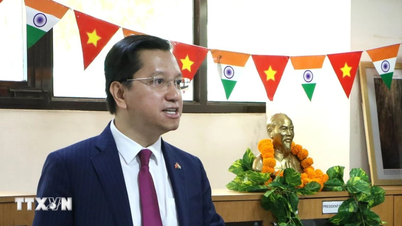




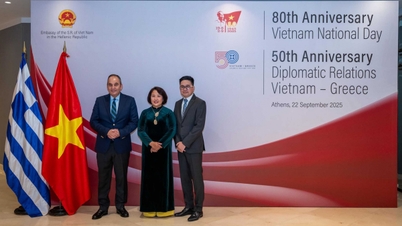

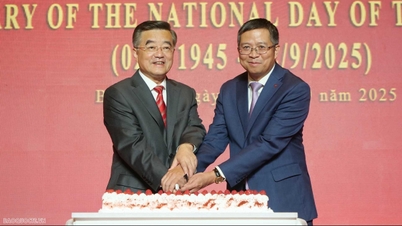


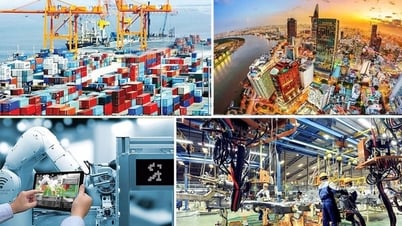



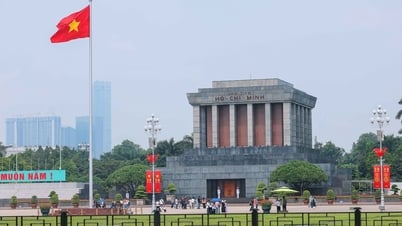











![[Photo] Super harvest moon shines brightly on Mid-Autumn Festival night around the world](https://vphoto.vietnam.vn/thumb/1200x675/vietnam/resource/IMAGE/2025/10/07/1759816565798_1759814567021-jpg.webp)

























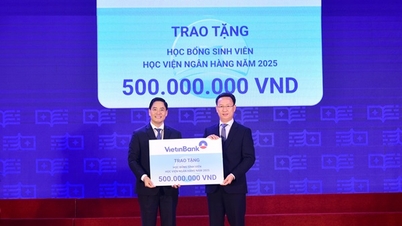











































Comment (0)